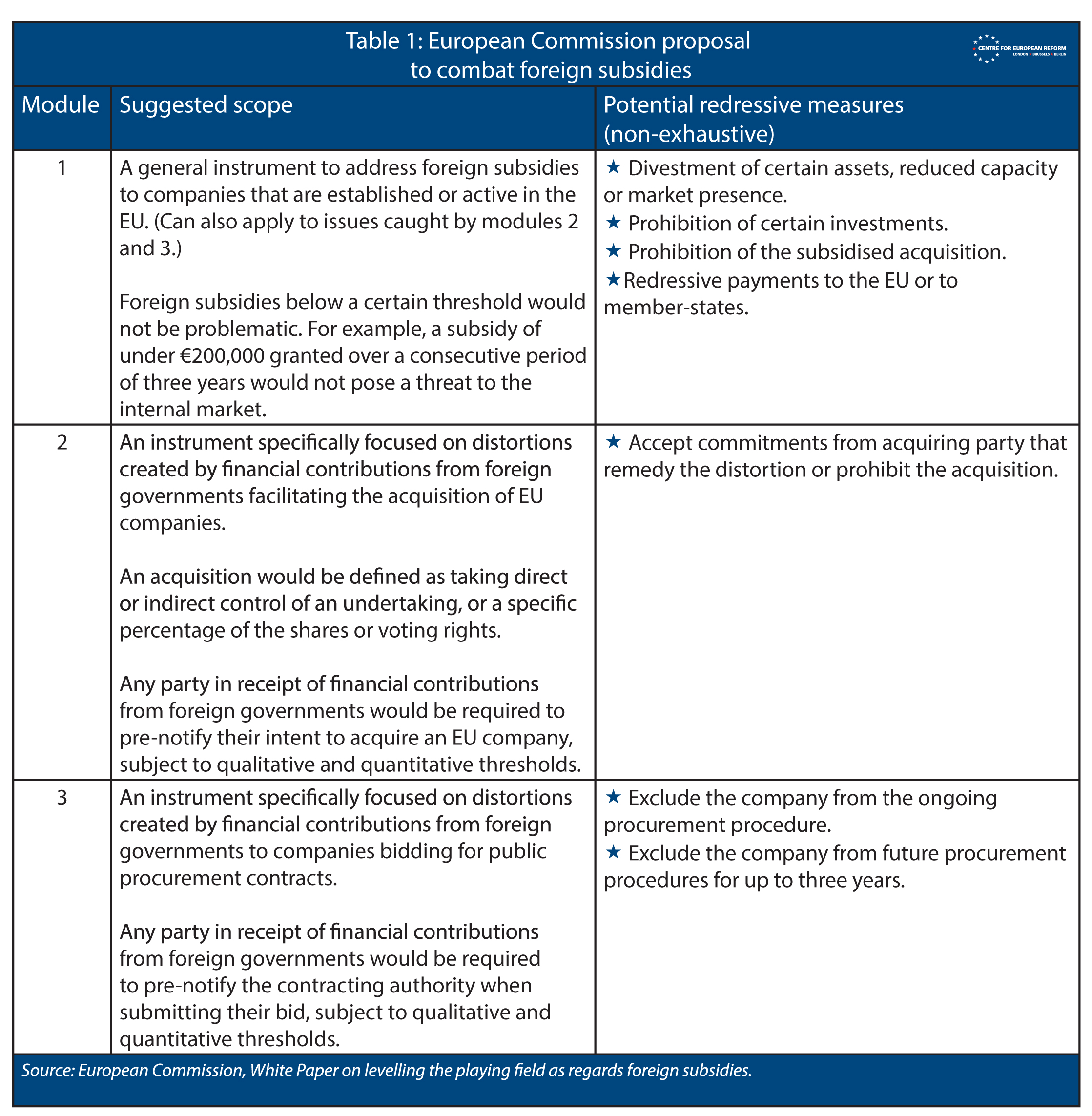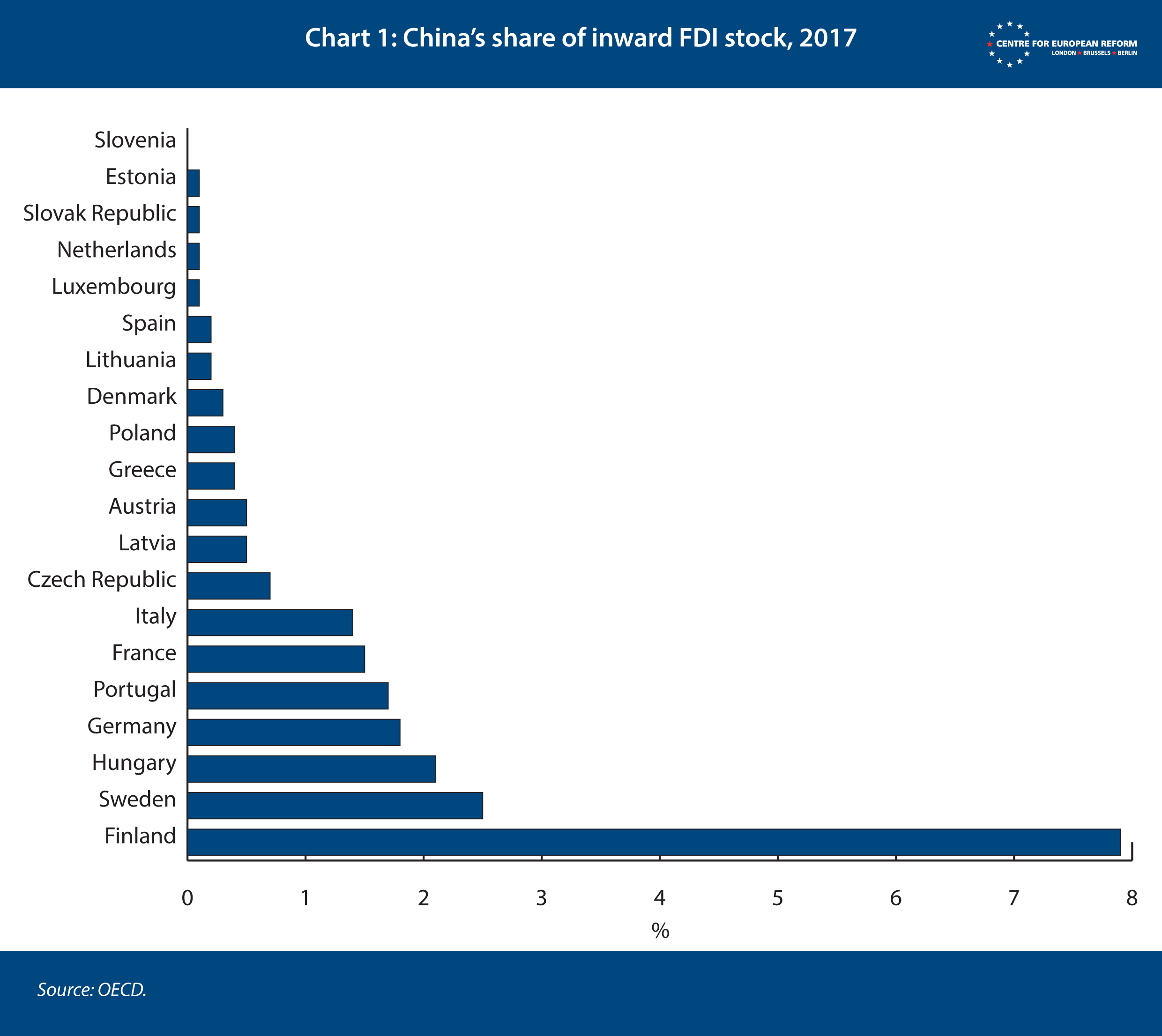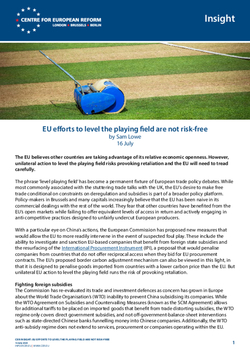
EU efforts to level the playing field are not risk-free
The EU believes other countries are taking advantage of its relative economic openness. However, unilateral action to level the playing field risks provoking retaliation and the EU will need to tread carefully.
The phrase ‘level playing field’ has become a permanent fixture of European trade policy debates. While most commonly associated with the stuttering trade talks with the UK, the EU’s desire to make free trade conditional on constraints on deregulation and subsidies is part of a broader policy platform. Policy-makers in Brussels and many capitals increasingly believe that the EU has been naive in its commercial dealings with the rest of the world. They fear that other countries have benefited from the EU’s open markets while failing to offer equivalent levels of access in return and actively engaging in anti-competitive practices designed to unfairly undercut European producers.
Policy-makers in Brussels and many capitals increasingly believe that the EU has been naive in its commercial dealings with the rest of the world.
With a particular eye on China’s actions, the European Commission has proposed new measures that would allow the EU to more readily intervene in the event of suspected foul play. These include the ability to investigate and sanction EU-based companies that benefit from foreign state subsidies and the resurfacing of the International Procurement Instrument (IPI), a proposal that would penalise companies from countries that do not offer reciprocal access when they bid for EU procurement contracts. The EU’s proposed border carbon adjustment mechanism can also be viewed in this light, in that it is designed to penalise goods imported from countries with a lower carbon price than the EU. But unilateral EU action to level the playing field runs the risk of provoking retaliation.
Fighting foreign subsidies
The Commission has re-evaluated its trade and investment defences as concern has grown in Europe about the World Trade Organisation’s (WTO) inability to prevent China subsidising its companies. While the WTO Agreement on Subsidies and Countervailing Measures (known as the SCM Agreement) allows for additional tariffs to be placed on imported goods that benefit from trade distorting subsidies, the WTO regime only covers direct government subsidies, and not off-government-balance-sheet interventions such as state-directed Chinese banks funnelling money into Chinese companies. Additionally, the WTO anti-subsidy regime does not extend to services, procurement or companies operating within the EU. To address this gap in its armoury, the Commission has proposed introducing new measures that would allow European enforcement agencies to intervene in the event that a company operating within the internal market is found to be in receipt of market-distorting foreign subsidies.
The Commission’s proposal is split into three so-called modules (Table 1). If enacted, supervisory authorities would be able to investigate companies suspected of receiving direct, or indirect, subsidies when operating within the single market, when acquiring EU companies and when bidding for EU procurement contracts. And if they identified a market distortion, a member-state or the Commission would then be able to seek redress by stopping certain investments, or imposing fines.

These proposals do not exist in isolation: they are part of a broader package of EU foreign investment screening and the proposed IPI. The IPI would penalise foreign companies bidding for public procurement contracts in the EU if their home-countries do not offer EU companies equivalent opportunities. The current proposal could see EU governments treating such bids as costing 20 per cent more than their stated value.
In tandem, the EU is also proposing a border carbon adjustment mechanism, which would see imports from jurisdictions with a lower domestic carbon price subject to additional import charges. And moves are afoot to introduce greater conditionality to EU free trade agreements in respect of commitments to uphold environment and labour standards. I have previously written about both the proposed border carbon adjustment mechanism and updating the EU’s approach to trade and sustainable development; they are born of the same desire as the new proposal on foreign subsidies, to unilaterally create a level playing field for EU companies.
What are the risks?
There are two risks associated with the EU’s renewed pursuit of a level playing field. The first is that it will reduce foreign investment and competition within the single market. The second is that acting unilaterally will undermine its voice as an advocate of rules-based multilateralism, and provoke retaliation from aggrieved trading partners.
While not explicitly aimed at China, there is little doubt that the new proposal on foreign subsidies is driven by a desire to curb its economic influence in Europe. Yet, taking into account that foreign direct investment (FDI) statistics do not paint a complete picture, it is notable that Chinese investment only accounts for a relatively small proportion of the total inward FDI stock in member-states (Chart 1).

China’s low FDI share means that European fears of subsidised Chinese companies distorting the single market may currently be overblown, although it is reasonable to assume that Chinese investment will increase over time, leading to greater market distortions if supported by unfair subsidies. In any case, a tougher approach to Chinese investment poses little risk to the European economy as a whole. Indeed, with the EU being a net exporter of savings to the rest of the world there is little reason to think that any future Chinese investment shortfall could not be made up for by domestic investors.
A tougher approach to Chinese investment poses little risk to the European economy as a whole.
Of greater concern is the risk that unilateral measures to tackle subsidies and imported carbon could undermine the EU’s position when advocating for multilateral solutions. The EU could leave itself open to claims of hypocrisy if it is both advocating for multilateral solutions to shared problems while acting unilaterally to penalise those who do not follow its pre-determined approach. Equally, retaining the ability to act unilaterally arguably gives the EU more leverage in its multilateral negotiations. For example, countries might be keener to follow through on their multilateral climate obligations in the coming years if they know the alternative is the EU taking matters into its own hands and introducing a carbon levy that would penalise foreign imports.
However, due to its over-reliance on exports and foreign demand – in 2019 the EU-27 ran a current account surplus of €385 billion – the EU, and especially member-states such as Germany and the Netherlands, are vulnerable to retaliation. The fear of the US placing tariffs on imported European cars, or China cutting its imports of machinery, neuters the EU’s ability to act unilaterally and erodes member-states’ support for collective action. This means that while the Commission wants greater powers to act against unfair practices, in practice it will need to tread carefully to ensure that any intervention is carried out in a non-discriminatory manner, and only when absolutely necessary.
The fear of the US placing tariffs on imported European cars, or China cutting its imports of machinery, neuters the EU’s ability to act unilaterally and erodes member-states’ support for collective action.
Multilateral action should continue to be the EU’s preferred approach. On climate, the successful implementation of the Paris Agreement should be the EU’s priority. On foreign subsidies, reforming the WTO to account for Chinese state-capitalism is the optimal scenario. But multilateral action on climate change and trade rules reform is not solely in the EU’s gift. The EU must react to the world as it is, not only as Europe might wish the world to be. In this context, it is reasonable for the EU to develop its own tools to unilaterally combat unfair practices. But the EU’s export-oriented economic model leaves it vulnerable to retaliation, particularly from the larger economies. And while the threat of action might prove useful as leverage in its multilateral discussions, it should be careful not to overplay its hand.
Sam Lowe is a senior research fellow at the Centre for European Reform.


Add new comment